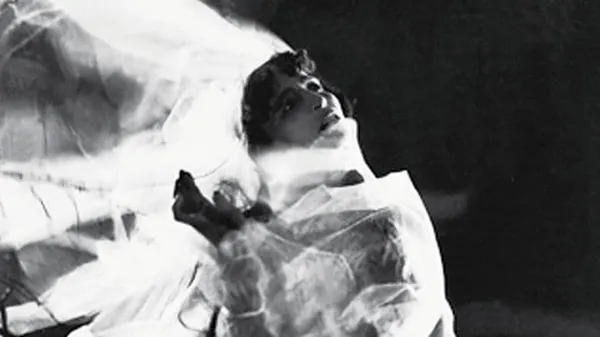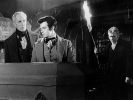Eye For Film >> Movies >> The Fall Of The House Of Usher (1928) Film Review
The Fall Of The House Of Usher
Reviewed by: Jennie Kermode

One of the first feature length horror films, this (very loose) adaptation of Edgar Allen Poe's famous story sees a visitor (Charles Lamy) gradually uncovering the secrets of an isolated mansion. At its heart sits tortured aristocrat Roderick Usher (Jean Debucourt), obsessively painting a portrait of his beloved Madeleine (Marguerite Gance). Something is very wrong with Madeleine, and every stroke of Roderick's brush seems to weaken her further, as if his attempt to confer upon her a sort of immortality is sapping her mortal life force. She falls into a catatonic faint, but could she be dead? As boundaries blur, the visitor uncovers hints of a longstanding family curse, and Roderick himself begins to struggle.
Scripted in part by Luis Buñuel, who walked out when he felt Epstein was distorting the story too much, this is a film whose impact on the early silent era was significant not least because of its use of imagery to communicate where its contemporaries relied much more on gesture. Debucourt makes a splendid Roderick, his haunted eyes roving around great Gothic halls swirling with mist and debris. Making Madeleine his wife rather than his sister (a reflection of the incestuous dynamic in the text which Roger Corman made so much of in his 1960 version) allows the film to tread what is superficially a more conventional path but, in removing the implication of hereditary disorder, places increased emphasis on the supernatural and on the suggestion of madness transmitted through abusive treatment. Gance gives us perhaps the most realistic portrayal of mental as well as physical illness in any screen version of her character, though she has only a short period in which to work. For most of the film she is absent, and it is only then that Roderick seems to notice her, his guilt conjuring up a ghostly apprehension much more real to him than his living, breathing wife ever was.

A visually masterful film that very much retains its power today, The Fall Of The House Of Usher introduced many of the tropes of the horror genre, using simple but highly effective special effects techniques to give us guttering candle flames, creeping shadows and shuddering wooden doors whose creaking we can sense even though we can't hear it. Though it will be difficult for the average viewer today to appreciate just how innovative it was, its atmosphere remains potent. Roderick's famous library has no specific home here but is distributed throughout the house, illustrating the desperation with which he seeks the answers to vital questions in his books. Pages come loose, battering their words across the screen in brief flashes, providing wayward clues. They become fragments of the house, or of Roderick's mind, as the two disintegrate in tandem.
Even for those intrigued by cinematic history, sitting through important and influential films can sometimes be quite dull - significance does not always equate to quality. This film, however, delivers on all counts. It's best seen on a big screen with live musical accompaniment, so its atmosphere can be relished to the full, but it's a treat under any circumstances.
Reviewed on: 10 Dec 2014















